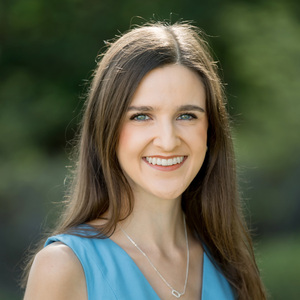Dr. Arianna Molloy, associate professor of communication studies, is helping turn on the lights to illuminate darkness caused by burnout. In her new book, Healthy Calling: From Toxic Burnout to Sustainable Work, Molloy looks inside the different levels of burnout an individual may be experiencing, including feeling unmotivated in one’s life calling. She dives into the importance of recognizing God as the true caller in one’s life, surrendering the role of “caller” in one’s own life to the one who really places meaning into life.
Keep reading to hear from Molloy about her writing process and thoughts on the book topic.
Describe the approach of Healthy Calling and the topics it covers in comparison to other books about faith and work or vocation.
At the risk of being too lengthy, here's another way to view it: The number of books about meaningful work speaks to the evergreen relevance of this topic. Most of these books have been written by sociologists, business-minded professionals, or psychologists. These heavy hitters write with the backing of philosophy, social science and personal experience. But there’s something missing in their approach to helping people minimize stress and live a more joyful life. Healthy Calling addresses the missing piece in the conversation about burnout, calling and meaningful work — for two key reasons. First, it approaches the topic from a social science framework with a distinctly Christian perspective. The goal of this book is to integrate faith throughout the process, pairing it with data, experience and stories. Second, Healthy Calling is informed by a communication background, which means there is a recognition that what we say and what we hear significantly impact our beliefs, values and actions. The discipline of communication offers the dual approach of rich theory and compelling practicality. This book also offers a fresh and more accurate understanding of the role of humility and uncovers an important layer to the concept of calling by addressing the impact of community.
What inspired you to research the topic of calling burnout and write a book about it?
I've always been fascinated by the way people talk about their work. As a Christian, I've been especially interested in the way our faith and relationship with God influences our work. As I studied the bright side of Calling for over a decade, I also took note of the dark side. I was curious how people who feel called moved away from a healthy calling to things like workaholism and job idolization. Why did this happen? How did this happen? The end result was a particular kind of burnout that had some unique qualities to it because of the calling dynamic. I've always been passionate about mentorship and I saw this as an opportunity to help those experiencing burnout to find their way out, and for those who have not yet experienced it, to avoid the dangers of toxic burnout. When we are operating from a healthy calling, it feels like worship, like a deep connection to the Lord. When we are in calling burnout, there's a particular kind of shame that can be deeply imprisoning. My goal is that no one would feel locked in that prison. There is a way out!
How are you integrating your research on this topic into what you teach in the classroom?
One thing I love about being a communication professor is that all of my research is relevant in the “right now,” the immediate for students and post-college adults. When we learn healthy community practices, we have an incredible advantage — a superpower tool belt of knowledge and skill-sets that can be immediately applied in the workplace. One way students entering the workplace can navigate work/life balance is by seeking mentors to help them continue to learn and grow. We aren't meant to do life alone. Learning from others in their wisdom and experience will help us make good choices in our own lives.
Is there something you found while researching that was particularly challenging to you? Enlightening/encouraging?
The thing I keep coming back to in my research on calling is that calling is about relationship. Calling is about a relationship with ourselves (the called), with the Caller (God), and with the community we impact (and who impact us). What this means is that it is dynamic. It changes, develops, and grows. It isn't something we control. There's an element of surrender to our Caller that's essential. There's also an element of courage that's required as we pursue development. And, there's an element of empathy needed as we engage with our community. We must know ourselves, keep learning and be willing to rest. Calling is complex but so, so worth pursuing!
Molloy’s book is available for purchase on . Listen to Molloy share her thoughts on this topic on the “When Your Calling Leads to Burnout” episode of the Think Biblically podcast.
In 51¬‹¿Ú‚Äôs Division of Communication in the School of Fine Arts and Communication, students are prepared to meet today‚Äôs challenges and develop employer-impressing skills that are in demand across career fields ‚Äî from marketing to media, from medicine to ministry, and everything in between. Learn more and apply today.
Interview conducted by Sarah Dougher, media relations specialist. For more information, or if you would like to be featured in a Faculty Highlight, email media.relations@biola.edu.
 51¬‹¿Ú
51¬‹¿Ú.jpg)

.jpg)
.jpg)
.jpg)